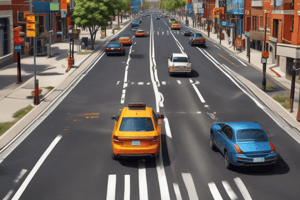Podcast
Questions and Answers
What does a green light indicate?
What does a green light indicate?
- Stop and yield
- Proceed with caution
- Prepare to stop
- Go, you have the right-of-way (correct)
What does a yellow light signify?
What does a yellow light signify?
- Your right-of-way is ending (correct)
- You can ignore the signal
- You may proceed without stopping
- You must stop immediately
What should you do at a red light?
What should you do at a red light?
- Proceed with caution
- Stop and yield (correct)
- Speed up
- Turn left
If there is a green arrow displayed with a red or green light, what can you do?
If there is a green arrow displayed with a red or green light, what can you do?
What does a yellow flashing arrow for turning movements mean?
What does a yellow flashing arrow for turning movements mean?
What do yellow flashing lights indicate at an intersection?
What do yellow flashing lights indicate at an intersection?
What should you do if you see a red flashing light?
What should you do if you see a red flashing light?
What does approaching a red light or stop sign require you to do?
What does approaching a red light or stop sign require you to do?
What does a yield sign indicate?
What does a yield sign indicate?
How should you act at an intersection with no sign or signal?
How should you act at an intersection with no sign or signal?
How should lane markings be interpreted?
How should lane markings be interpreted?
What must you do before changing lanes?
What must you do before changing lanes?
Flashcards are hidden until you start studying
Study Notes
Traffic Light Signals
- Green Light: Indicates it’s safe to go; right-of-way granted if the intersection is clear.
- Yellow Light: Signals right-of-way is ending; proceed if unable to stop safely but yield if necessary.
- Red Light: Requires a complete stop; cannot enter the intersection until green and clear.
Intersection Turns
- Green Arrow with Red/Green Light: Right-of-way granted for turns if the intersection is clear.
- Yellow Flashing Arrows: Turn is allowed after yielding to pedestrians and oncoming traffic; steady yellow indicates the right-of-way is declining.
- Red Light Turns: Possible under specific conditions; come to a full stop, check for pedestrians and traffic. Right turns allowed from red unless stated otherwise. Left turns permitted only from one-way to one-way streets.
Traffic Control Signals
- Yellow Flashing Lights: Caution advised; yield to pedestrians and oncoming traffic when turning.
- Red Flashing Lights: Equivalent to a stop sign; halt completely and yield to all traffic and pedestrians. Proceed only when clear.
Stopping at Intersections
- Stopping for Red Lights/Stop Signs: Halt at solid white lines or before entering crosswalks/intersections; a complete stop for 120 seconds may permit proceeding through red.
- Yield Signs: Slow down and prepare to stop for vehicles or pedestrians with the right-of-way.
Non-functioning Signals
- Non-Operating Signals: Stop and yield to cross traffic before proceeding cautiously.
- No Signs or Signals: Yield to other vehicles when exiting an alley or driveway.
Pedestrian Signals
- Pedestrian Signals: Indicate when it is safe for pedestrians to cross.
Lane Markings
- Yellow Lane Markings: Separate lanes of traffic in opposite directions; broken yellow lines can be crossed for passing, solid lines should not be crossed except for turning.
- White Lane Markings: Separate lanes going in the same direction; broken white lines can be crossed for lane changes, solid lines should not be crossed.
Lane Changes
- Changing Lanes: Signal intention at least 200 feet before changing; check for traffic ahead, use mirrors and blind spot checks, and ensure enough room before moving.
General Lane Usage
- Lane Usage on Highways: Slower vehicles should remain in the right lane, while the left lane is reserved for faster traffic or passing.
Studying That Suits You
Use AI to generate personalized quizzes and flashcards to suit your learning preferences.




